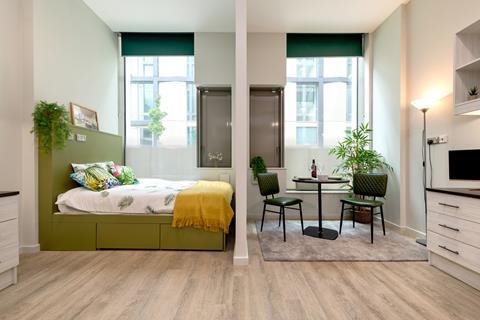The PBSA sector faced its challenges throughout the pandemic, but admission levels this year have shown that more 18-year olds than ever are looking to go to university.

Property Week sat down with Richard Skeels, CEO of CRM Students, to get his take on the current state of the market, discuss the upcoming challenge of cost of living increases and to discuss what the future holds for the sector.
An increase in demand
Skeels acknowledges that the pandemic was a difficult time for the market but adds that there has been no let-up in demand from young people for the university experience - quite the opposite in fact. “We currently have more 18-21 year olds as a population than for some time so demand has increased,” he says.
Crucially for the purpose-built student accommodation (PBSA) market that includes overseas students once again choosing to come to the UK, which is encouraging. .“Speaking to other operators, it’s been a very good year and we are back to pre-pandemic levels,” says Skeels.
Recent headlines showed students either unable to find accommodation in their chosen city, having to travel long distances and live away from their peers or having to queue up overnight outside estate agents in order to secure accommodation. It isn’t just about geography and demand, however – there is the element of affordability of students, a topic that is in the spotlight now more than ever in light of the recent cost of living increase.
Cost of Living and the power of PBSA
Students in HMOs are responsible for sorting out their own utilities, which can be a challenge for first years living away from home for the first time and particularly at a time of soaring energy costs. Historically, the PBSA sector may have appeared more expensive, but in the present climate its typical all-inclusive offer provides a certainty when it comes to costs that isn’t available elsewhere.

What’s more, Skeels points out that because of its scale CRM Students can negotiate better prices with utilities firms on behalf of its residents, something that the vast majority of HMO landlords are unable to do. “As an operator of a number of sites, we have some buying power,” he explains.
“We work with suppliers, and we can negotiate a good price. I think the PBSA operators have had some buying power and have got some stability, but it’s a very big question at the moment as to what will happen with utilities going forward. There are clearly some challenges over costs on the horizon. It’s about trying to mitigate those challenges when we can.”
The knock-on effect
Despite being able to negotiate a better price, cost of living remains at the forefront of Skeels’ mind. He notes that the PBSA sector is not the only one having to think about costs - key suppliers such as maintenance staff, cleaners and contractors are also putting their costs up. He adds: “If suppliers are putting up their costs… our clients are asking how we can control those costs. There’s an ongoing conversation and it is usually a fair conversation.”
The aim of said conversations with clients is to negotiate a rent that offsets these cost increases, whilst also maintaining both an affordable price for the students and generating sufficient income for clients.
Despite what are, hopefully, short term concerns, Skeels is confident that the PBSA sector’s trajectory will continue to be upwards. As has been well reported, after all, many HMO landlords are selling up due to forecast decreases in property values and a less favourable tax environment, leaving a substantial gap in the market. What’s more, students now expect a better-quality product.
“The benchmark has been raised,” he says. “It’s now about getting good stock back into the marketplace that is fit for purpose and for the future.”






























No comments yet